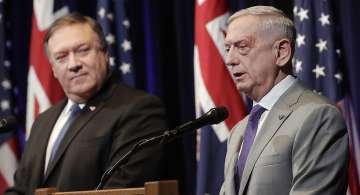US accuses China of repressing religious groups like Christians, Tibetans and Uighur Muslims
China, however, denied the allegations and asked the Trump administration to stop interfering in China’s internal affairs.

The United States on Friday accused China of repressing religious groups like Christians, Tibetans and Uighur Muslims living in that country.
US Secretary of State Mike Pompeo and Defence Secretary James Mattis raised the issue with their visiting counterparts, Minister of National Defence Gen Wei Fenghe and Chinese Communist Party Office of Foreign Affairs Director Yang Jiechi, in Washington.
The visiting Chinese leadership, however, denied the allegations and asked the Trump administration to stop interfering in China’s internal affairs.
“I stated the United States and the international communities will continue to express our concerns with respect to China’s repression of religious groups and Christian, Buddhists and 800,000 to possibly millions of Muslims that have been denied their freedoms,” Pompeo said at a joint news conference here along with Mattis and the two Chinese leaders.
Yang immediately denied the US allegations.
“China respects human rights, as other countries must do the same. As President Xi Jinping points out, there is always room for improvement on human rights,” he said.
Asserting that in China, people have the freedom to believe or not believe in religion, he said they are all Chinese citizens. “Their human rights have been fully respected and protected. It is our hope that the United States could respect the fact,” Yang said.
“All in all, China and the United States should step up communication on the basis of mutual respect, and work to handle well its own affairs,” Yang said.
Responding to a question on allegations of rights violations against Tibetans and Muslim Uighurs, Pompeo said the US is unequivocal when it comes to human rights. “We ask every country, China included,” he said.
“We have discussions to make sure that they treat the people of their nations with the respect and dignity that every human being is entitled to, and when it comes to religious minorities in China, we had a conversation about how it is that we hope the Chinese will treat their religious minorities, and our concerns with respect to that,” Pompeo said.
Yang said matters related to Xinjiang province are China’s internal affairs and foreign countries have no right to interfere.
The Chinese government attaches great importance to social and economic development in Xinjiang and it has taken a host of measures to promote stability, development, unity and people’s well-being, he said.
“At the same time, within the confines of law, the government has taken steps to crack down on ethnic separatist activities and violent terrorist crimes to safeguard national security and life and property of the people. These measures have paid off,” Yang said.
“Right now, Xinjiang enjoys social stability. Its economy is growing with a strong momentum, and ethnic groups are existing with each other in harmony,” Yang said.
“We hoped that the United States could respect the fact and look at relevant matters in an objective light, and stop interfering in China’s internal affairs,” he said.
“In Tibet, ethnic minorities are having good relations, and their rights and interests are protected. A lot of foreign people have been to Tibet and Xinjiang. Facts are facts,” Yang said.
(With PTI inputs)